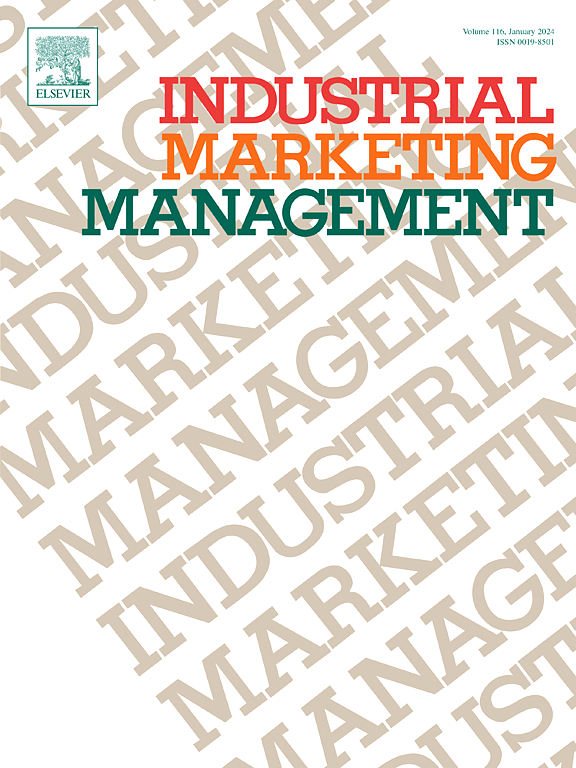Navigating the AI wave for sales management: The mediating role of marketing agility
IF 7.5
1区 管理学
Q1 BUSINESS
引用次数: 0
Abstract
Sales management has undergone significant transformations in response to the changing external environment and the adoption of emerging technologies such as artificial intelligence (AI) tools, including Seamless AI and Einstein (Sales AI). These technological advancements have reshaped the industrial sales management landscape and customer journeys. To thrive in this evolving environment, industrial firms must embrace marketing agility, characterized by proactiveness, responsiveness, flexibility, and speed. This study explores business-to-business (B2B) firms' challenges when integrating AI into their sales management processes. Based on the dynamic capabilities literature, we argue that marketing agility plays a mediating role in the adoption of AI technology and sales team performance in uncertain business contexts. Additionally, we investigate the moderating effects of marketing influence and internal organizational climate on the relationship among AI technology adoption, agility, and performance. We collected data from B2B sales managers from companies generating at least $5 million in annual revenues and employing more than 100 individuals. Our findings underscore the necessity for aligning strategic decisions, such as technology adoption (and use), with marketing agility to affect firm performance positively. Theoretically, this study contributes to the emerging literature on the facilitators of marketing agility in B2B firms.
引导销售管理的人工智能浪潮:营销敏捷性的中介作用
随着外部环境的变化以及人工智能(AI)工具(包括Seamless AI和Einstein (Sales AI))等新兴技术的采用,销售管理经历了重大变革。这些技术进步重塑了工业销售管理格局和客户旅程。为了在这个不断变化的环境中茁壮成长,工业企业必须拥抱营销敏捷性,其特点是主动性、响应性、灵活性和速度。本研究探讨了企业对企业(B2B)公司在将人工智能集成到销售管理流程中时所面临的挑战。基于动态能力的文献,我们认为在不确定的商业环境中,营销敏捷性在采用人工智能技术和销售团队绩效方面起着中介作用。此外,我们还研究了营销影响力和内部组织氛围对人工智能技术采用、敏捷性和绩效之间关系的调节作用。我们收集了B2B销售经理的数据,这些公司的年收入至少为500万美元,员工人数超过100人。我们的研究结果强调了将战略决策(如技术采用(和使用))与营销敏捷性结合起来对公司绩效产生积极影响的必要性。从理论上讲,本研究有助于新兴文献对B2B企业营销敏捷性的促进因素。
本文章由计算机程序翻译,如有差异,请以英文原文为准。
求助全文
约1分钟内获得全文
求助全文
来源期刊

Industrial Marketing Management
Multiple-
CiteScore
17.30
自引率
20.40%
发文量
255
期刊介绍:
Industrial Marketing Management delivers theoretical, empirical, and case-based research tailored to the requirements of marketing scholars and practitioners engaged in industrial and business-to-business markets. With an editorial review board comprising prominent international scholars and practitioners, the journal ensures a harmonious blend of theory and practical applications in all articles. Scholars from North America, Europe, Australia/New Zealand, Asia, and various global regions contribute the latest findings to enhance the effectiveness and efficiency of industrial markets. This holistic approach keeps readers informed with the most timely data and contemporary insights essential for informed marketing decisions and strategies in global industrial and business-to-business markets.
 求助内容:
求助内容: 应助结果提醒方式:
应助结果提醒方式:


